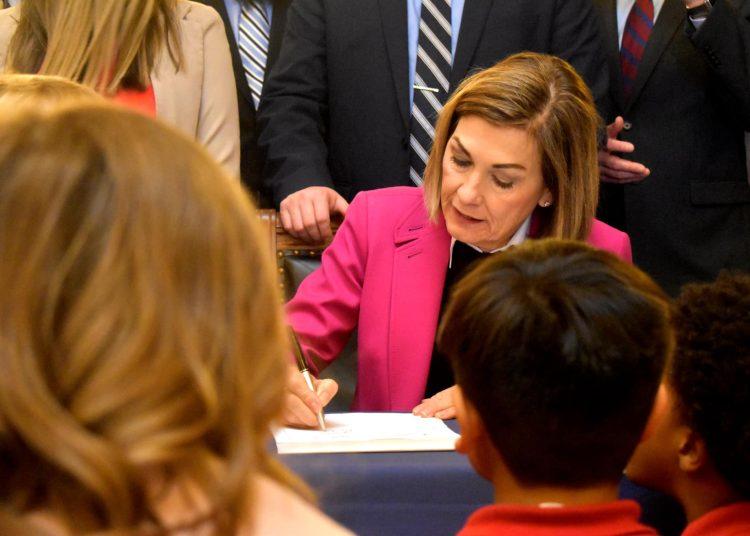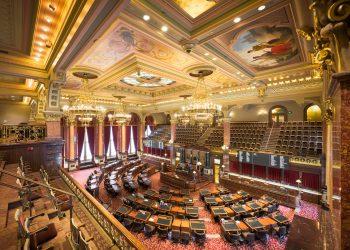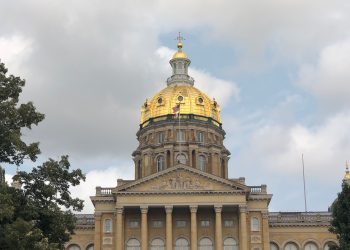DES MOINES, Iowa – Gov. Kim Reynolds signed HF 68 into law on Tuesday morning in the Iowa State Capitol Rotunda with hundreds of supporters. The bill named the Students First Act makes state education funding available for K-12 students who choose to attend private schools.
“Public schools are the foundation of our education system and for most families they will continue to be the option of choice, but they aren’t the only choice,” Reynolds said. “For some families, a different path may be better for their children. With this bill, every child in Iowa, regardless of zip code or income, will have access to the school best suited for them.”
“Republicans in Iowa have continuously fought for school choice. But school choice means different things to different people. It might be public school to public school through open enrollment. It might mean public school to charter school, it could mean public school to nonpublic school or as we found out throughout COVID, it might mean can my kids even go to school in a classroom,” Iowa Senate Majority Leader Jack Whitver, R-Ankeny, said during the signing ceremony.
“Throughout this entire conversation – we put parents and kids first. With the passage of House File 68 last night, Iowa will lead the nation in educational opportunities and school choice options for our families,” he added.
The Iowa House of Representatives passed Gov. Kim Reynolds’ school choice bill, HF 68, 55 to 45 on Monday evening. The Iowa Senate followed suit passing the bill 32 to 18 shortly after midnight on Tuesday. The measure creates education savings accounts that families can use to pay for nonpublic school tuition and other education expenses. All Iowa students will be eligible for education savings accounts within three years.
The bill was introduced by Gov. Kim Reynolds as one of her legislative priorities for the 2023 session.
Nine Iowa House Republicans (State Reps. Michael Bergan, Brian Best, Jane Bloomingdale, Chad Ingels, Brian Lohse, Gary Mohr, Thomas Moore, David Sieck, and Brent Siegrist) joined Iowa House Democrats voting against the bill. However, after the 2022 elections, Iowa House Republicans expanded their majority, and some school choice opponents among their ranks lost their primaries, allowing the school choice measure to pass after similar bills stalled in the chamber the last two years.
Two Iowa Senate Republicans (State Senators Charlie McClintock and Tom Shipley) joined Iowa Senate Democrats in opposition to the bill.
The vote in the Iowa House took place after almost six hours of debate. The Iowa Senate begun debate late Tuesday afternoon, but stood at ease ten minutes later to await the vote in the Iowa House. The Iowa Senate debated the Iowa House version of the bill for three hours following its passage in that chamber.
“I am thrilled that both the Iowa House and the Iowa Senate have passed the Students First Act and I look forward to signing it into law later today. For the first time, we will fund students instead of a system, a decisive step in ensuring that every child in Iowa can receive the best education possible. Parents, not the government, can now choose the education setting best suited to their child regardless of their income or zip code. With this bill, Iowa has affirmed that educational freedom belongs to all, not just those who can afford it,” Reynolds said in a released statement early Tuesday morning responding to the vote.
“This bill is about freedom for the family to make a decision. This bill is about where that family feels that child will be best taught. This bill is not about attacking teachers. The opponents of this bill will state that we’re attacking teachers over and over again tonight. Nothing could be further from the truth,” State Rep. John Wills, R-Spirit Lake, who was the floor manager of the bill, said during the debate.
School choice advocates applauded the passage of the bill.
“We commend Governor Kim Reynolds and Iowa lawmakers for leading the charge for freedom and educational choice. The passage of this legislation makes Iowa one of the first states in the nation to offer universal Educational Savings Accounts and puts our state at the forefront of the fight for educational freedom. This signature bill puts Iowa families in the driver’s seat of their children’s education and gives students the greatest opportunity to succeed. We are proud of this remarkable step, and we hope Iowa can be an example for the rest of the country to change the inequitable status quo and do what is best to ensure every student succeeds,” Drew Klein, Iowa State Director of Americans for Prosperity, said in a released statement.
Universal eligibility will be phased in over three years. All incoming Kindergarteners and all public-school students will be eligible beginning year one with the start of the 2023-2024 school year. Eligibility for families of children currently enrolled in accredited private schools will be income based over the first two years.
- During the 2023-2024 school year, private school students with household incomes at or below 300% of the federal poverty level (FPL), currently $83,250 for a family of four, are eligible.
- In the 2024-2025 school year, private school eligibility expands to include families with household incomes at or below 400% FPL, currently $111,000 for a family of four, are eligible.
- Beginning in the 2025-2026 school year, all K-12 students in Iowa are eligible regardless of family income.
Parents or guardians who enroll their eligible children in an accredited private school will receive an amount equal to the per pupil funds allocated by the state to all public school districts each year. The funds are estimated at $7,598 per pupil for the 2023-2024 school year and will be deposited into an education savings account (ESA) to be used for tuition, fees, and other qualified education expenses.
Also, public schools will retain approximately $1,202 per pupil in categorical funding for each student who attends private school. So they continue to receive funding for students they are not educating. The bill also increased flexibility for how school districts can spend their money. Right now, the State earmarks school districts’ budgets for specific programs, and some of those dollars go unspent. HF 68 will allow school districts to use these funds to increase teachers’ salaries if they choose.
Iowa House Republicans also voted to change the rules to bypass the Appropriations Committee. Reynolds said that the program could cost $341 million once the program is fully phased in.
The state has issued a request for proposal (RFP) from businesses with experience managing ESA programs. The RFP was issued first for targeted small businesses in Iowa and will be posted publicly after 48 hours according to Iowa code. Responses are expected within three weeks. The vendor selected will manage the application process, support the transfer of funds from the state to ESA accounts of eligible students, and ensure program compliance.
Once a vendor is selected and the system is implemented, the application period will begin. Applications will be accepted through June 30, 2023.
Information is available on the Iowa Department of Education website at educateiowa.gov and will be updated regularly. Families interested in applying for ESAs can sign up to receive notifications when new information is posted on the webpage.
Read the enrolled version of the bill:
HF68















